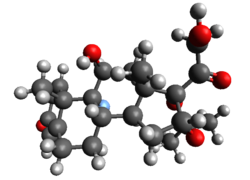Chemistry:Triamcinolone acetonide
 | |
 | |
| Clinical data | |
|---|---|
| Trade names | Kenalog, Nasacort, Xipere, others |
| AHFS/Drugs.com | Monograph |
| MedlinePlus | a601124 |
| License data | |
| Pregnancy category |
|
| Routes of administration | Topical, joint injection, nasal |
| ATC code | |
| Legal status | |
| Legal status | |
| Pharmacokinetic data | |
| Metabolism | Liver |
| Excretion | Urine (75%) and feces (25%) |
| Identifiers | |
| |
| CAS Number | |
| PubChem CID | |
| IUPHAR/BPS | |
| DrugBank | |
| ChemSpider | |
| UNII | |
| KEGG | |
| ChEBI | |
| ChEMBL | |
| PDB ligand | |
| Chemical and physical data | |
| Formula | C24H31FO6 |
| Molar mass | 434.504 g·mol−1 |
| 3D model (JSmol) | |
| Melting point | 290 to 294 °C (554 to 561 °F) |
| |
| |
| | |
Triamcinolone acetonide, sold under the brand name Kenalog among others, is a synthetic corticosteroid medication used topically to treat various skin conditions,[12] to relieve the discomfort of mouth sores, and by injection into joints to treat various joint conditions. It is also injected into lesions to treat inflammation in some parts of the body, particularly the skin. In nasal spray form, it is used to treat allergic rhinitis. It is used for the treatment of macular edema associated with uveitis.[10] It is a more potent derivative of triamcinolone, and is about eight times as potent as prednisone.[13]
Most forms of triamcinolone acetonide are prescription drugs. In 2014, the U.S. Food and Drug Administration (FDA) made triamcinolone acetonide an over-the-counter drug in the United States in nasal spray form under the brand name Nasacort.[13] It is available as a generic medication.[14]
Medical uses
Triamcinolone acetonide as an intra-articular injectable has been used to treat a variety of musculoskeletal conditions. When applied to the skin as a topical ointment, it is used to mitigate blistering from poison ivy, oak, and sumac.[citation needed] When combined with nystatin, it is used to treat skin infections with discomfort from fungus, though it should not be used on the eyes.[15] It provides relatively immediate relief and is used before using oral prednisone. Oral and dental paste preparations are used for treating aphthous ulcers.
As an intravitreal injection, triamcinolone acetonide has been used to treat various eye diseases and has been found useful in reducing macular edema.[16] Drug trials have found it to be as efficient as anti-VEGF drugs in eyes with artificial lenses over a two-year period. A systematic review did not find any evidence of any benefit in preventing vision loss in eyes treated with triamcinolone acetonide over placebo, for patients with age-related macular degeneration.[17]
Triamcinolone acetonide is also administered via intralesional injection in the treatment of hypertrophic and keloid scars.[18][19]
Contraindications
Evidence suggests that usage of triamcinolone acetonide or other steroids to treat macular edema increases the risk of increasing intraocular pressure in patients.[20]
Triamcinolone acetonide should not be used by those with tuberculosis or untreated fungal, bacterial, systemic viral or herpes simplex infections without consulting a doctor first.
Pharmacology
Pharmacodynamics
Triamcinolone acetonide is a corticosteroid. It is specifically a glucocorticoid, or an agonist of the glucocorticoid receptor, that is about five times as potent as cortisol. It has very little mineralocorticoid effects.[21] The affinities of triamcinolone acetonide for the androgen and estrogen receptors are both <0.1% (relative to testosterone and estradiol).[22] However, triamcinolone acetonide has 15% of the affinity of progesterone for the progesterone receptor.[22] In relation to this, triamcinolone acetonide can produce endocrine side effects like ovulation inhibition and menstrual irregularities.[23][24][25]
Chemistry
Triamcinolone acetonide, also known as 9α-fluoro-16α-hydroxyprednisolone 16α,17α-acetonide or as 9α-fluoro-11β,16α-17α,21-tetrahydroxypregna-1,4-diene-3,20-dione cyclic 16,17-acetal with acetone, is a synthetic halogenated cyclic ketal pregnane corticosteroid.[26] It is the C16α,17α acetonide of triamcinolone.[26]
Veterinary use
Triamcinolone acetonide is also used in veterinary medicine as an ingredient in topical ointments and in topical sprays for control of pruritus in dogs.[27]
A series of injections with triamcinolone acetonide or another corticosteroid may reduce keloid size and irritation. It is used as a preinductor and/or inductor of birth in cows. It was also used in the horse racing industry, but it is now a banned substance if found in a horse's system on race day.[28]
References
- ↑ "KENALOG IN ORABASE triamcinolone acetonide". Australian Register of Therapeutic Goods (ARTG). Australian Government. https://www.tga.gov.au/resources/artg/19205.
- ↑ "KENACORT A10 triamcinolone acetonide". Australian Register of Therapeutic Goods (ARTG). https://www.tga.gov.au/resources/artg/19204.
- ↑ "NASACORT AQ Triamcinolone acetonide". Annual charge exemptions dataset. Department of Health and Aged Care, Australian Government. https://www.tga.gov.au/resources/annual-charge-exemptions/nasacort-aq-triamcinolone-acetonide-55-microgram-actuation-nasal-spray-bottle-2019-20.
- ↑ "Aristocort C Product information". 25 April 2012. https://health-products.canada.ca/dpd-bdpp/info.do?lang=en&code=35785.
- ↑ "Nasacort Allergy 24HR Product information". 25 April 2012. https://health-products.canada.ca/dpd-bdpp/info.do?lang=en&code=90220.
- ↑ "Adcortyl Intra-Articular/Intradermal Injection 10mg/ml - Summary of Product Characteristics (SmPC)". 8 October 2021. https://www.medicines.org.uk/emc/product/1410/smpc.
- ↑ "Kenalog Intra-articular / Intramuscular Injection - Summary of Product Characteristics (SmPC)". 8 April 2022. https://www.medicines.org.uk/emc/product/6748/smpc.
- ↑ "Nasacort 55 micrograms/dose, nasal spray, suspension - Summary of Product Characteristics (SmPC)". 1 November 2021. https://www.medicines.org.uk/emc/product/6708/smpc.
- ↑ "Nasacort Allergy Relief for Adults 55 micrograms/dose, nasal spray, suspension - Summary of Product Characteristics (SmPC)". 1 November 2021. https://www.medicines.org.uk/emc/product/6501/smpc.
- ↑ 10.0 10.1 "Xipere- triamcinolone acetonide injection, suspension". https://dailymed.nlm.nih.gov/dailymed/drugInfo.cfm?setid=c55c3521-a033-4683-9a57-3207f59a4029.
- ↑ "Active substance(s): triamcinolone (topical and nasal formulations)". List of nationally authorised medicinal products. European Medicines Agency. 8 March 2018. https://www.ema.europa.eu/en/documents/psusa/triamcinolone-topical-nasal-formulations-list-nationally-authorised-medicinal-products-psusa/00003017/201707_en.pdf.
- ↑ "Triamcinolone Topical". https://medlineplus.gov/druginfo/meds/a601124.html.
- ↑ 13.0 13.1 "Nasacort Allergy 24HR- triamcinolone acetonide spray, metered". 3 February 2014. https://dailymed.nlm.nih.gov/dailymed/drugInfo.cfm?setid=4bff57a5-cce0-401c-a0fe-23c65c1b7ddc.
- ↑ "Competitive Generic Therapy Approvals". 3 March 2023. https://www.fda.gov/drugs/generic-drugs/competitive-generic-therapy-approvals.
- ↑ "Nystatin And Triamcinolone (Topical Route)". Mayo Foundation for Medical Education and Research. http://www.mayoclinic.org/drugs-supplements/nystatin-and-triamcinolone-topical-route/description/drg-20062448.
- ↑ "Intravitreal steroids for macular edema in diabetes". The Cochrane Database of Systematic Reviews 2020 (11): CD005656. November 2020. doi:10.1002/14651858.CD005656.pub3. PMID 33206392.
- ↑ "Surgical implantation of steroids with antiangiogenic characteristics for treating neovascular age-related macular degeneration". The Cochrane Database of Systematic Reviews 1 (1): CD005022. January 2013. doi:10.1002/14651858.CD005022.pub3. PMID 23440797.
- ↑ "Intralesional Steroid Therapy (Patient Information Leaflets)". 2008. http://www.bad.org.uk/patient-information-leaflets/intralesional-steroid-therapy/?showmore=1&returnlink=http%3a%2f%2fwww.bad.org.uk%2ffor-the-public%2fpatient-information-leaflets%3fl%3d0%26q%3dkeloid%26range%3dkeloid#.Xm4_9iWnyEc.
- ↑ "The treatment of keloids with triamcinolone acetonide". Plastic and Reconstructive Surgery 38 (3): 202–208. September 1966. doi:10.1097/00006534-196609000-00004. PMID 5919603.
- ↑ "Intravitreal steroids versus observation for macular edema secondary to central retinal vein occlusion". The Cochrane Database of Systematic Reviews 2015 (9): CD007324. September 2015. doi:10.1002/14651858.CD007324.pub3. PMID 26352007.
- ↑ (in de) Arzneistoff-Profile. 10 (19 ed.). Eschborn, Germany: Govi Pharmazeutischer Verlag. 2004. Triamcinolon. ISBN 978-3-7741-9846-3.
- ↑ 22.0 22.1 Drug Toxicity in Embryonic Development II: Advances in Understanding Mechanisms of Birth Defects: Mechanistics Understanding of Human Development Toxicants. Springer Science & Business Media. 6 December 2012. pp. 437–. ISBN 978-3-642-60447-8. https://books.google.com/books?id=vcHsCAAAQBAJ&pg=PA437.
- ↑ "Corticosteroid Injections: A Review of Sex-Related Side Effects". Orthopedics 40 (2): e211–e215. March 2017. doi:10.3928/01477447-20161116-07. PMID 27874912.
- ↑ "The mechanism of ovulation inhibition by triamcinolone acetonide". The Journal of Clinical Endocrinology and Metabolism 46 (1): 8–14. January 1978. doi:10.1210/jcem-46-1-8. PMID 376542.
- ↑ "In vitro and ex vivo binding to uterine progestin receptors of the rat as a tool to assay progestational activity of glucocorticoids". Methods and Findings in Experimental and Clinical Pharmacology 4 (4): 237–242. 1982. PMID 7121132.
- ↑ 26.0 26.1 The Dictionary of Drugs: Chemical Data: Chemical Data, Structures and Bibliographies. Springer. 14 November 2014. pp. 1228–. ISBN 978-1-4757-2085-3. https://books.google.com/books?id=0vXTBwAAQBAJ&pg=PA1228.
- ↑ Genesis (triamcinolone acetonide) Topical Spray Drug information
- ↑ Champion Hurdle favorite Yanworth failed drug test
External links
- "Triamcinolone acetonide". Drug Information Portal. U.S. National Library of Medicine. https://druginfo.nlm.nih.gov/drugportal/name/triamcinolone%20acetonide.
- "Triamcinolone". https://medlineplus.gov/druginfo/meds/a601122.html.
- "Triamcinolone Nasal Spray". https://medlineplus.gov/druginfo/meds/a682791.html.
 |

